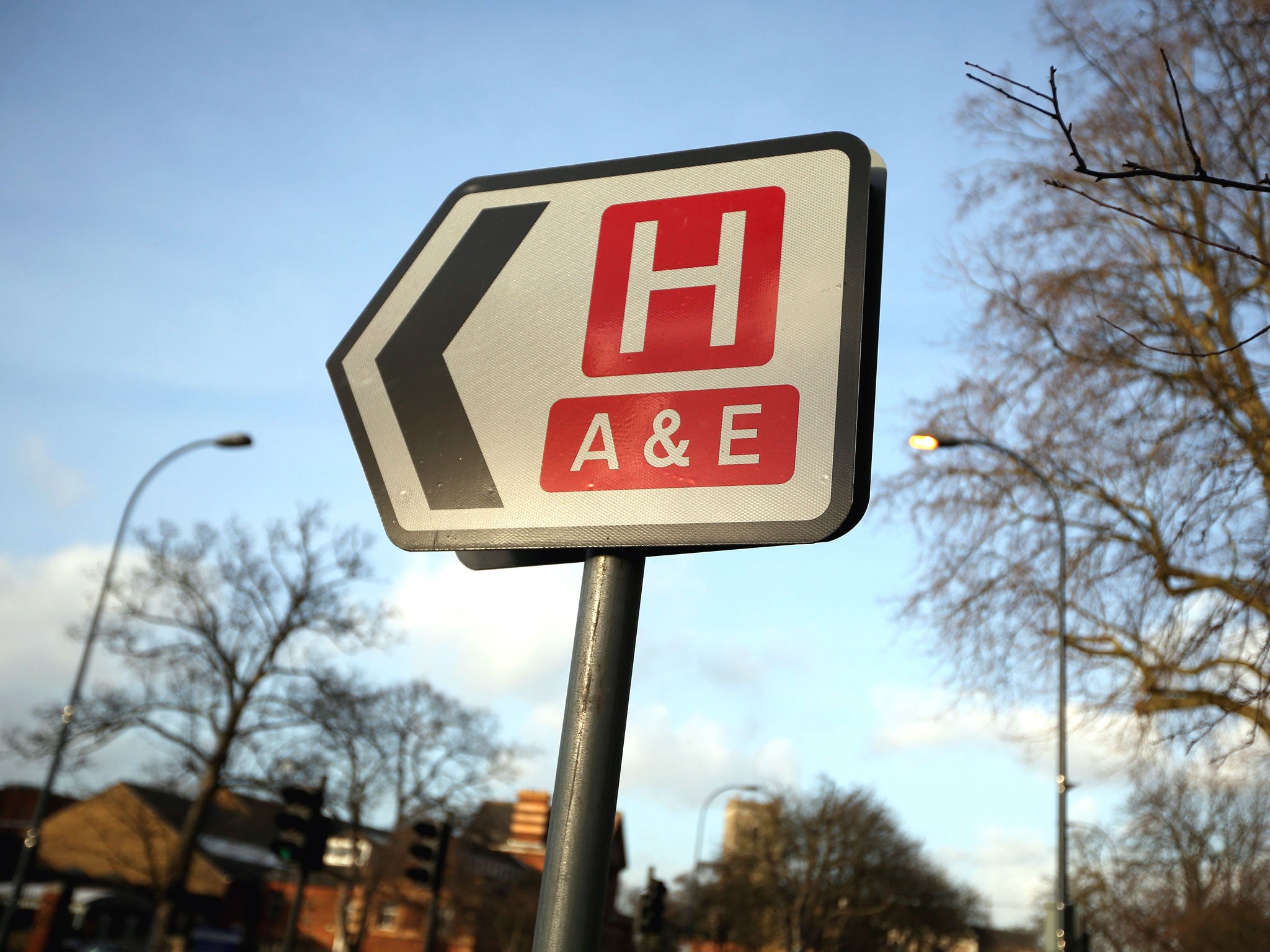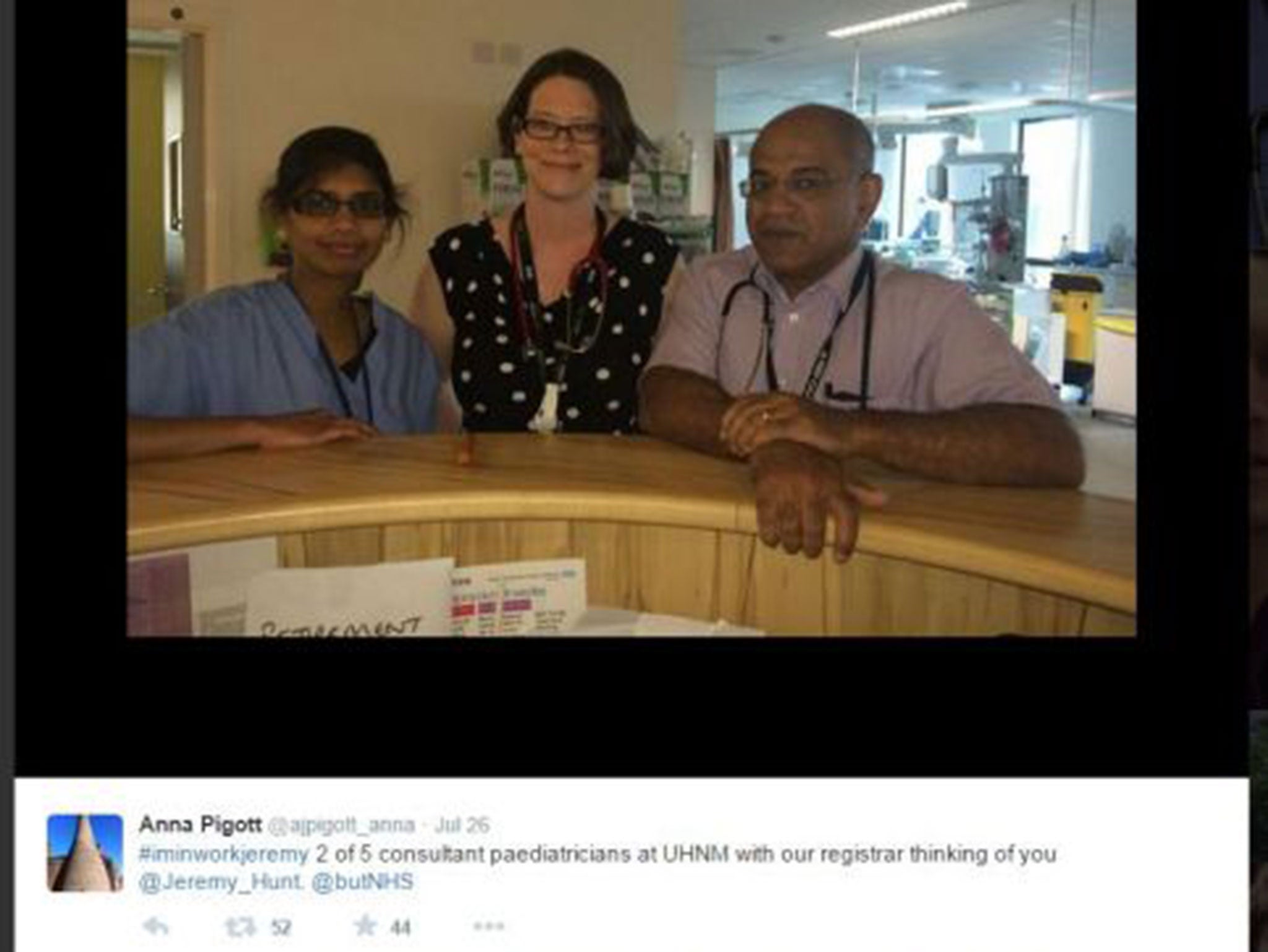Doctors declare war on Jeremy Hunt over weekend working 'myths' amid plan for seven day NHS
Exclusive: Professionals are 'furious' at the Health Secretary for spreading ‘myths’ about numbers that die at weekend

Your support helps us to tell the story
From reproductive rights to climate change to Big Tech, The Independent is on the ground when the story is developing. Whether it's investigating the financials of Elon Musk's pro-Trump PAC or producing our latest documentary, 'The A Word', which shines a light on the American women fighting for reproductive rights, we know how important it is to parse out the facts from the messaging.
At such a critical moment in US history, we need reporters on the ground. Your donation allows us to keep sending journalists to speak to both sides of the story.
The Independent is trusted by Americans across the entire political spectrum. And unlike many other quality news outlets, we choose not to lock Americans out of our reporting and analysis with paywalls. We believe quality journalism should be available to everyone, paid for by those who can afford it.
Your support makes all the difference.Jeremy Hunt has “peddled myths” about doctors’ workloads and demoralised the NHS workforce over plans for more seven-day services, the leader of Britain’s doctors has claimed, as a survey reveals nine out of 10 consultants are already on evening and weekend rotas.
Ahead of crunch contract talks, Dr Mark Porter, chairman of the British Medical Association (BMA), said the profession was “furious” with the Health Secretary, who told it to “get real” over the need for a “proper seven-day service in hospitals” last month.
Using unprecedented language, Dr Porter accused Mr Hunt of “calling into question the professionalism” of the most senior doctors.
Mr Hunt’s comments have led to a furious backlash among doctors. A petition to Parliament proposing a vote of no confidence in the Health Secretary has attracted more than 200,000 signatures.
But the Department of Health has accused the BMA of trying to turn the debate on seven-day services into a “politicians vs doctors battle” and challenged consultants to drop a clause in the current contract that allows them to opt out of doing non-emergency work over weekends.
A BMA survey of nearly 900 consultants shows that 88 per cent are on a “non-resident on-call rota”, which means they are regularly required to attend hospital at evenings or weekends if required, often in emergencies.

More than two-thirds told the survey they had been on call on Saturday or Sunday in the past week, working an average of six hours, with much longer demands of up to nine hours for those in specialities required in emergencies, such as surgeons and anaesthetists.
Half of the consultants reported having their sleep disturbed while on call on weekday evenings and a third had to go in at night over the weekend. Only three out of 10 reported receiving any rest time after attending hospital overnight, and before commencing their ordinary working week again.

BMA negotiators are preparing for last-minute talks over both consultant and junior doctor contracts ahead of a September deadline, at which point Mr Hunt has said he would be willing to impose a new contract.
Dr Porter said that the BMA wanted patients to have access to “high-quality care, seven days a week”, but said the Government had failed to explain how it was going to pay for extra routine cover at weekends – not just from doctors but also nurses, diagnostic specialists and other hospital staff required to provide a full service.
He claimed the survey figures revealed that “the myths peddled by the Health Secretary on consultant working patterns are just that”.
“Almost all consultants work evenings and weekends, and in areas like emergency medicine they have been the driving force behind delivering 24/7 working patterns,” he said. “Doctors are furious with Jeremy Hunt for calling into question their professionalism and dedication to their patients,” he added.
“This has been laid bare through the force of the public backlash in recent weeks. His comments are demoralising at a time when frontline NHS staff are working longer and harder in an NHS that is under increasing pressure and still trying to deal with the fallout from the last government’s unwanted reorganisation.”
In making the case for a more comprehensive seven-day service, Mr Hunt said that around 6,000 people lose their lives every year because of a lack of “proper” weekend services. His claim is based on NHS England evidence that mortality rates within 30 days of entering hospital are 11 per cent higher for those admitted on a Saturday, and 16 per cent higher for those admitted on a Sunday.
But this does not necessarily mean patients are more likely to die in hospital at the weekend, and it remains unclear whether the 30-day excess mortality is solely because of the care these patients get in hospital.

Sir Bruce Keogh, the medical director of NHS England, told MPs on the Health Committee last week that patients admitted at the weekend are already “sicker”. Professor Keogh also warned against describing “statistical excess” deaths as necessarily “avoidable”.
Meanwhile, a recent analysis of the case for more seven-day services by health researchers at the universities of Manchester and York found there was “a lack of evidence” that increasing the levels of consultant cover at weekends leads to reductions in mortality rates.
Their study, published in the Health Economics journal, also said that the cost of providing comprehensive seven-day services would be between £1bn and £1.4bn.
Dr John Appleby, the chief economist at the King’s Fund think-tank, said it was “very hard to see” how the NHS could afford the measures under current spending plans. “The money is not there. There is zero extra cash,” he said.
A Department of Health spokesperson said: “The BMA can’t have it both ways: if most consultants do work weekends why are they objecting to removing the right to opt out of weekend work?
“If we are to reduce avoidable deaths, it isn’t just the Health Secretary who is insisting on change: hospital leaders, senior clinicians, patient groups and the independent NHS pay review bodies all say the opt-out should be removed.
“The BMA would like to turn this into a politicians vs doctors battle instead of confronting the real changes necessary to make patients safer in our hospitals.”
Case study
A consultant from the North-west, who asked not to be named, says he already has a seven-day working life
I am a consultant cardiologist based in the North-west of England. In my large teaching hospital, we deliver 24/7 consultant-led care, with a designated consultant on call each week. When on call, I work as normal during the day and overnight I take calls, provide advice and often need to come into hospital.
It is becoming more and more common to be called in to hospital overnight. During my last week on-call, I was contacted in the early hours of the morning three nights in a row. On the first two nights I was able to provide advice over the phone, however as I get older I am finding it harder to go back to sleep having been woken up during the night.
On the third occasion, I had just finished an extremely busy day dealing with a large number of seriously ill patients. The emergency department was very busy and I worked late, getting to bed at 1am. I fell asleep, exhausted, but was awoken at 3am as there was a patient who was extremely unwell. I went into the hospital and by the time the patient had been treated and was stable it was 6.30am. I was due back on the ward at 8am, so there was no point in battling the rush hour traffic to return home to sleep.
At 8am I phoned round my colleagues to see if anyone could cover for me that day given my busy night on call. Unfortunately, everyone had a full day of work scheduled in and covering me would mean cancelling other patients. I felt tired, but reasonably alert and there was no real option but to continue with my normal working day.
By late morning, I began to feel very tired. I developed a headache and was finding it difficult to concentrate. I needed to re-read sections of the patients’ records, ask my juniors to repeat things they had already told me. It was taking me noticeably longer to make decisions. Despite wanting to work at my usual pace, see my patients and get home on time to rest, everything took much longer than normal. I was very conscious that I needed to be extra vigilant to avoid making mistakes and trying harder to maintain my concentration only added to my fatigue.
Eventually I completed my ward round and managed to make it home. Once I arrived I was greeted by my young children, who I hadn’t seen for 48 hours as they had been in bed by the time I had been arriving home. They were excited and wanted to play. Unfortunately, I had no energy left to give and I went to bed, hearing the disappointment in their voices and waiting for the next phone call.
Over time, these intense working patterns have an effect, not just on your health, but on your life outside of work. In the past few years I’ve seen more colleagues suffering from burnout, or choosing to leave medicine early. Across the NHS, the number of staff taking sick leave for work-related stress is on the rise.
I think it’s something that really needs to be addressed, not least as the NHS is only going to get busier.
Join our commenting forum
Join thought-provoking conversations, follow other Independent readers and see their replies
Comments